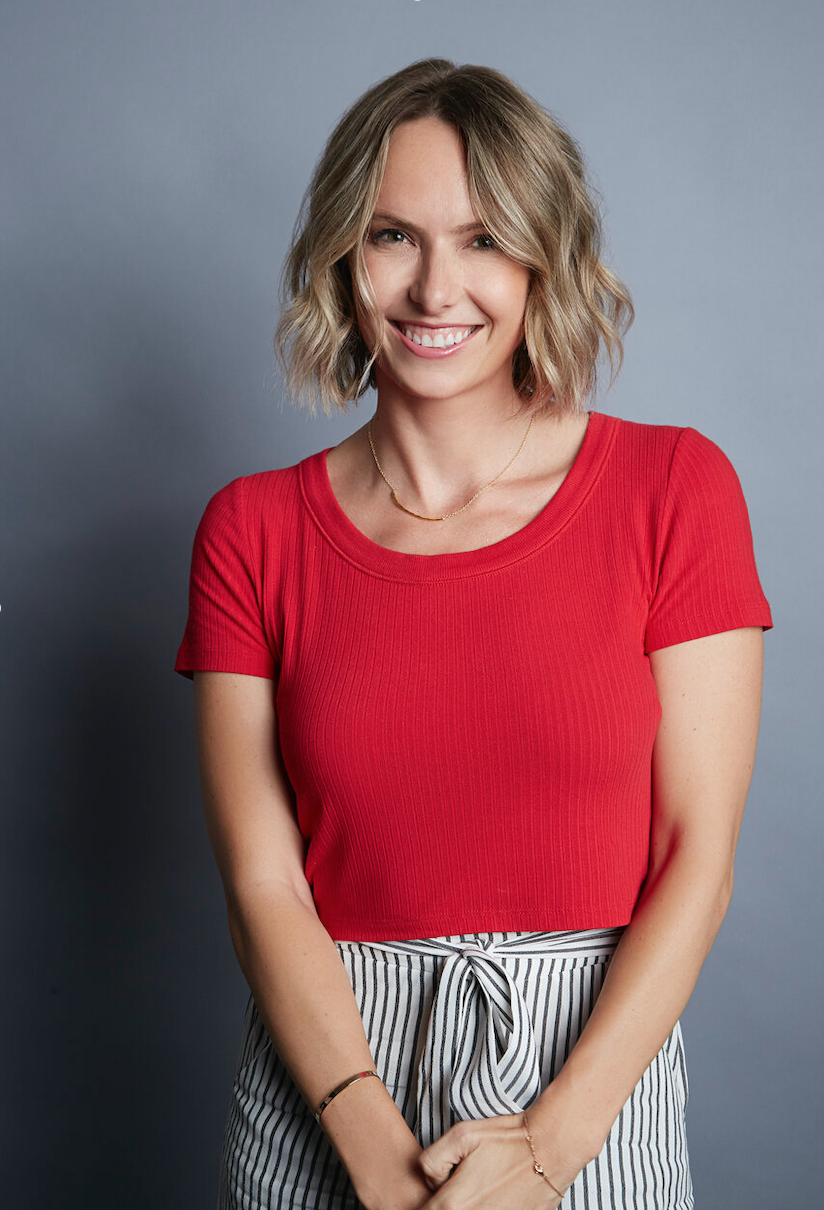
JR: Tell me about growing up — how did you get into music?
JW: Music has always been an integral part of my life. I was brought up with a mixture of studying classical piano, listening to 1950s, 1960s oldies, and watching Rogers & Hammerstein musicals on repeat – I was obsessed with musicals and would learn the lyrics to every song, word-for-word. By the time I went to college, I was studying to become a concert pianist with the hopes to perform at the Walt Disney Concert Hall, but soon realized that performing gave me more anxiety than joy. This is when I started looking at other careers in the musical vein, ones that didn’t involve me being center stage, which led me to music supervision. It wasn’t an easy road to get there, but after a few internships and a job as an executive production assistant for a show called Mr. Sunshine, I finally landed a role as a music coordinator working for music supervisor, Ann Kline. Ann exposed me to a variety of projects, including Shameless, Under the Dome, and Pan Am. As I kept exploring the world of music supervision, I wanted to understand how it worked differently in film, so I took a job as a music coordinator for Julia Michels at Format Entertainment, where I worked on a variety of notable Hollywood blockbuster hits including Pitch Perfect 2, Trolls, and Bad Moms. After coordinating and learning the craft for about 6 years, I decided it was time to dive in and see what kind of projects I could supervise on my own. As fate would have it, I was able to stay within Format and start supervising alongside Dave Jordan, Julia Michels, Julianne Jordan, and the rest of the Format supervision team. Think of it like a promotion from coordinator to supervisor. Five years later and I’m still here!
JR: What is the biggest difference music supervising TV vs. Film?
JW: In TV, it’s all about the pace and turnaround. Everything moves really fast. Editorial will, at times, need songs at the ready within 2 to 3 hours max. A TV show can be done within five or six months. Films, on the other hand, can take up to 2 years — sometimes even 3, especially if you are dealing with animated projects.
JR: Now with the explosion of streaming going on, with Netflix, Amazon, Hulu, and so many outlets, there’s so much being produced. But then the pandemic held up production. So how are you coping with all that?
JW: When the pandemic hit, we were starting post on a couple of projects including The Haunting of Bly Manor and Barb and Star Go to Vista Del Mar. Our main course of action was to figure out how to start working remotely as soon as possible. Thankfully, technology such as Zoom, Evercast, and the help of an incredible post production team, we were able to set up remote scoring sessions, oversee the recording of an entire orchestra seamlessly in Europe, and review our final music mix to ensure all elements were in place before delivery.
JR: Any other pandemic related issues you had to deal with?
JW: Projects that were delayed due to the pandemic, were now back in full force by August with plans to shoot in Canada or on a secured sound stage here in Los Angeles. This meant taking many precautionary measures to prevent the spread of Covid. All cast and crew had to wear PPE gear daily as well as take numerous Covid tests in order to ensure the safety of everyone on set. This made our job a bit tricky, especially when we were dealing with on-camera singing moments with multiple singers and musicians involved. Prior to shoot, we had to send easy-to-use ADR kits for our singers & actors to pre-record in their hotel rooms while they quarantined. If not in their hotel rooms, we would pre-record them at an approved recording studio, all of which needed to follow union and studio Covid protocols.
JR: What projects have you found were the most challenging?
JW: I am currently working on a television series with Toko Nagata where we had to research and approve a ton of hymns for our actors to sing on set. You would be surprised by the amount of hymns that are not in the public domain! We made sure that all songs we pre-recorded a) were following the original PD lyrics and b) the arrangements were not under copyright. Thankfully, both Toko and I have a classical background where we can read sheet music easily and know that the arrangement we had on hand was OK to use. We also ran everything by the studio’s legal department to make sure we were covered on all fronts and wouldn’t face any legal repercussions.
JR: When you get a project put on your desk what is the process you go through? What do you do first, second, third, fourth?
JW: First, I read the script and flag any on-camera moments. These scenes range from a band playing at a wedding to a car ride sing-along, so whenever the script has someone singing or playing an instrument, I take note. After reading the script, I create a general playlist of songs that I think fits tonally based on the landscape, overall sentiment, and the characters depicted. I share this playlist with the director and producers involved to make sure that I’m in line with their creative vision, and if all is in place, I start reaching out to music companies, big and small, looking for that specific tone. From there, I oversee all aspects of the musical on-cameras while shooting takes place and when we wrap, we head straight into post-production. Once I receive a rough cut of the film or TV episode, I start the process of clearing and replacing songs to ensure that we are cleared, good to go, and under budget before we final mix and printmaster.
JR: So speaking about budget — are you finding that when you’re doing clearance, the majors are a little more willing to bend even on famous compositions and recordings?
JW: It’s a case-by-case basis and really depends on a few variables: the project itself, the overall production budget, the type of use, the timing, the terms, etc. Does the fee increase if there’s explicit content? Yes, probably, but if the artist is super interested and wants to be involved, there’s a slight chance you could get the fee at a lower rate. All the labels and publishers are very helpful and want to make it work for you. If you have low money, they try to figure out alternative ways to make it happen even if it’s festival rights only. I don’t think that process has changed too much.
JR: Other than the number of productions there’s a lot that’s been delayed due to the pandemic but we’re finding it’s a pretty good time for representing independent music that’s unaffiliated yet outstanding.
JW: Yes, with the amount of content being released on a weekly basis, there’s a lot of room for indie artists to place their music, which is great. There are also more opportunities for me to supervise films and TV shows and help smaller artists gain recognition through sync placements. MusicSupervisor.com has a catalog of artists that have been beneficial in creating the sound of our projects. One of my favorite parts of supervision is sending out confirmation letters to artists and music companies alike as it brings me such joy knowing that a band or an artist is receiving some sort of nod to their creative work.
JR: It’s been a lot of fun because we’re also working with a couple of catalogs that have real vintage music from the 40s 50’s 60s 70s, 80’s 90’s. Productions perhaps cannot afford Aretha Franklin, but would like something authentic from that era but not famous. And so, we have tracks that’s clear both sides that we can license.
JW: It is a trend that’s come up a good amount. I’m always trying to find vintage tracks, spanning from the 40s to the 90s. Vintage Christmas specifically seems to be trending as well, it’s a year-round search!
JR: So with everything that you’ve been working on over the years — and I know you’ve worked on a lot of projects – do you get the feeling that you have gotten the hang of it, that you know in your gut what to do almost before you start?
JW: You’re always learning in this job. I feel like there’s always a new scenario or situation, but for the most part the nuts and bolts of it have been very clear to me. Sometimes political situations come up, and you ask yourself, OK how do I handle this? How do I make sure everyone’s happy? But for the most part I feel very confident about the process.
JR: What advice would you give people that are artists and writers that want to break into film and TV?
JW: I would say find a good sync company that can represent your music. It takes so long to nurture a relationship with supervisors. With the abundance of music that supervisors receive on a day-to-day basis, it’s hard to get in touch with us, so the best way is to have someone that already has a relationship and can pitch the songs. When I receive song submissions from solo artists that I do not know, it’s harder for me to believe that that artist owns 100% of the master and
publishing, or trust that a sample was not used in their song. Coming from a company like yours, I know for a fact that I’m going to be OK, I know that the fee is going to be right, and I can send songs directly to my editorial team knowing that they can use it without any issues.
JR: What advice would you give those interested in being a music supervisor?
JW: The network you create for yourself is so important. Get out there, volunteer, and meet people, starting with the Guild of Music Supervisors and The SCL (Society of Composers & Lyricists). Intern with different companies and learn as much as you can about the film, TV, and music industries as it will only help you in the long run. I try my best to answer questions from aspiring music supervisors whenever I can. I let them know it’s not an easy job, but this is the way you should do it. If the opportunity comes up, I highly recommend becoming a music coordinator to a supervisor as you will learn so much from that experience alone. It takes a year or two or more, but it’s what we love to do and it’s worth it. Most of all, be humble, do the work, and be nice & professional to everybody because you never know who’s going to end up being your boss!
Interview by Julius Robinson
818 625 0846
